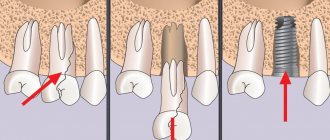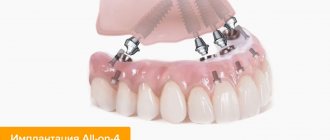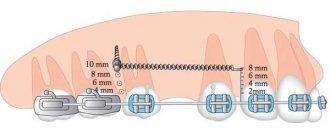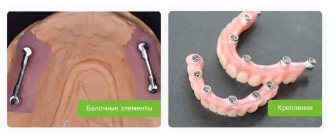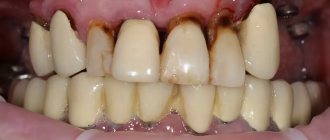Dentists often hear from patients asking them to explain to them which implants are better: Korean or Israeli. The products of manufacturers from these two countries are indeed the most in demand, since with decent quality they are in the average price range. To compare them with each other, consider the characteristics and properties of both.
Implant service life
We have dealt with the service life of prostheses, now we will consider the factors on which the useful service life of implants depends. Are installed implants really capable of lasting a lifetime? Yes, this is true, but subject to a number of conditions:
- The installation of implants is carried out strictly according to the protocol, by an experienced implantologist and after careful preparation for the operation;
- The prosthesis on the implant is installed correctly and manufactured with accurate calculation of the load;
- The operation used implants from trusted manufacturers that have high quality and all the necessary performance characteristics;
- The patient strictly follows all the doctor’s recommendations for caring for the teeth and oral cavity, not only after the operation, but also after the prosthetic stage.
IMPORTANT: You should know that if implant rejection occurs immediately after its installation and within a year after the operation, then the cause of such a complication in 90% of cases is medical errors. If implant rejection begins after 2-3 years or later, this is the patient’s fault due to the lack of high-quality oral hygiene.
Other useful material
Alternative to basal implantation
Implant installation
The best Swiss implants
Zirconium dioxide crowns: pros and cons
So which is better? Implantation or prosthetics?
It is wrong to answer this question remotely. It may happen that you have absolute contraindications for implantation, which you do not know about and which can be identified during diagnostics, which are always carried out in a clinic. Therefore, in order to make a choice between prosthetics and implantation, you must consult two specialists at once - an orthopedist and an implantologist.
If you are thinking about restoring your teeth with implantation or prosthetics and don’t know which technology will be better in your case, make an appointment with the specialists of our clinic in Moscow - “Aesthetica”! One of the main principles of our work is honesty with patients. We recommend only those dental restoration technologies that are fully capable of solving the patient’s problem and at the same time are absolutely safe for his health!
Advantages of restoring lost teeth with implantation
The benefits of dental implant restoration include:
1. Long useful life of implants. Many implant system manufacturers offer a lifetime warranty on their product.
2. Installation of implants allows you to obtain an aesthetic result of restoration - artificial teeth on implants cannot be visually distinguished from natural ones. In addition, after implantation, the correct chewing load is completely restored, side effects such as impaired diction, discomfort when chewing food do not occur, and the jaw bone tissue does not atrophy.
3. During implantation, there is no need to grind and depulp healthy teeth. In addition, during implantation, the chewing load will fall on the artificial root, and not on the adjacent teeth, which is important for maintaining their health.
4. Implantation is universal; it will allow you to restore any number of teeth.
5. Even if the prosthesis installed on the implant is damaged, the implant itself will not have to be removed to replace it. They will simply make you a new orthopedic structure, which will be placed on an artificial root.
But implantation also has certain disadvantages that are important to consider. The disadvantages of dental implantation include:
1. Quite a wide range of contraindications.
2. High price. Implantation is more expensive than prosthetics.
3. Implantation is a surgical intervention and therefore is more traumatic compared to prosthetics.
4. Long overall treatment periods. For example, with classic two-stage implantation, the total treatment period can be 8-12 months.
5. The need for bone grafting. This need does not always arise, only with severe bone atrophy in the area of implantation. It is impossible to install an implant into a thinned and lost bone so that it holds firmly, which is why an operation is performed to build up the bone tissue to the required parameters. This operation increases the treatment time and the cost of implantation.
However, despite some disadvantages, it is implantation that allows you to get the most durable and aesthetic result of dental restoration without causing harm to healthy teeth.
Peculiarities
Implants are made from grade 4 and 5 titanium. VTK dental implants are processed using the company’s unique technology - Double Acid Etched Surface. The surface with microscopic roughness is quickly overgrown with bone tissue, which contributes to excellent initial stabilization of the implants.
Abutments with connections in the form of an internal or external hexagon with or without a Morse taper allow you to fix any orthopedic structure at an optimal angle - from a single crown to a complete denture. The precision and tightness of the connection prevent even minimal movement of the structure and the spread of bacteria at the interface between the implant and the abutment.
Will the implant need to be replaced some time after the surgery?
Typically, the need to replace implants arises only when any complications arise—an active inflammatory process in the area of implantation of the artificial root, or implant rejection. Failure of implants due to stress or for other reasons is an extremely rare occurrence and almost never occurs in the practice of implantologists.
When might complications arise that require implant replacement? The inflammatory process in the area of implantation of the artificial root can appear both immediately after the operation and 10, 15, 20 years after the operation. In the first case, the cause of complications is most often one: medical errors. You can reduce your risk of implant rejection due to medical errors by choosing the right clinic and implantologist. It is important that the clinic has all the necessary equipment to conduct high-quality diagnostics before dental implantation, and that your attending physician is a competent specialist in his field, having not only the necessary knowledge base, but also practical experience in dental implantation.
IMPORTANT: The advertisements of many clinics say that they have the best conditions for treatment and use the most modern equipment; the country's leading implantologists work. Check these advertising promises with a personal visit to the clinic, because often they remain just beautiful words. A good clinic should really have high-quality diagnostic equipment installed, it should have its own implantologist on staff, and not an invited specialist from outside, and naturally, the doctor’s qualifications should be documented!
If implant rejection occurs several years after their installation, the cause of the complication is the patient’s careless attitude towards his health and poor oral hygiene. Many people think that neither dentures nor dental implants require maintenance, since they are all artificial structures that cannot be destroyed by caries. Therefore, they do not brush their teeth regularly, do not undergo professional teeth cleaning at the dentist and preventive examinations in the clinic. But plaque accumulates not only on natural teeth, it will accumulate on the gums, and pathogenic bacteria will actively multiply on the surfaces of the dentures and in it. These bacteria can provoke the onset of an inflammatory process in the area where implants are installed - peri-implantitis and even rejection of the dental implant. Therefore, after implantation and prosthetics, you should never forget about careful and regular oral hygiene!
Also, the need to replace the implant may arise due to jaw injuries, which result in implant mobility. If you feel that the implant has begun to wobble and see that the gums in the area where it is installed are swollen and red, consult a doctor immediately.
Quality control
The company carefully controls the quality of its products. Barcoding has been introduced into production; the entire process of manufacturing products is automated and takes place on the latest high-precision equipment. Quality is monitored by a specially developed computer system Manny (“Manny”). All BTK implants are accompanied by documentation confirming compliance with European quality standards ISO 9001 and ISO 13485. Moreover, you can trace the history of each product from manufacturing to installation. After implantation, the patient is given a special implant passport, which contains all the information about it.
About guarantees for implants and implantation
We have already written above that the quality and effectiveness of implantation largely depend not so much on the type of implants, but on the professionalism of the doctor and proper preparation for implantation. A good clinic will provide guarantees for implantation, and these guarantees should not be confused with the manufacturer’s warranty obligations for dental implants.
The guarantee for implants is the manufacturer’s obligation to replace the structure at its own expense if it breaks. Failure of implants rarely occurs, because artificial roots are made using special technologies and from ultra-strong materials. That's why many brands offer a lifetime warranty on their systems.
The clinic’s guarantee for implantation is responsibility for the service provided and the obligation to re-implant if the implant is rejected due to the doctor’s fault. The warranty period for implantation services is 1-2 years.
You may ask why implants have a long warranty, but the labor warranty is so short? The reason is quite simple: practice and statistics show that implant rejection due to medical errors is a complication that manifests itself within 1-2 years after installation. If the rejection of the artificial root begins later than the designated period, then the patient and his irresponsible attitude towards his own health are to blame. The doctor cannot and should not be held responsible for the negligence of patients, so there is no point in making the guarantee for implantation longer.
Why is it important to undergo dental implantation in a clinic that provides guarantees for treatment?
The availability of a guarantee for the services provided is the first thing you should ask about when talking with the administrators of the dental clinic. If there is no such guarantee, it is best to refuse treatment in this particular dentistry, because according to statistics, in 90% of cases, implants are rejected not through the fault of the patients, but due to medical errors. Without a guarantee, you will not be able to count on free re-implantation and replacement of the implant, and moreover, you will not be able to prove your case in court.
Having a guarantee for implantation is the key to receiving a quality service. A clinic that values its reputation and the trust of its patients will definitely offer you a written agreement that will clearly and clearly state the warranty obligations.
Also, to be sure that you will receive quality service in a particular clinic, always find out:
Doctor's qualification level. His experience, knowledge, and practical skills must be documented - diplomas, certificates. Look for information about the specialist on the Internet; there are many sites on which patients write reviews about doctors; it is also worth reading the book of reviews and suggestions in the clinic itself. A very important point - the implantologist in the clinic should not be a visiting specialist! You must be sure that if any complications arise, you will see an implantologist immediately;
Level of equipment of the clinic. Implantation is a serious type of surgical intervention that requires careful preparation for the operation and its preliminary planning. Therefore, the clinic must have appropriate modern equipment for diagnostics and all necessary manipulations during surgery.
Choose several clinics and visit consultations with specialists in them. Ask all the questions about dental implantation that interest you and, first of all, ask whether there have been cases of implant rejection in the doctor’s practice and what actions he took when this problem arose in patients. Pay attention to how the doctor will react and answer your questions: an experienced implantologist who respects his patients will understand your desire to learn as much information as possible about the upcoming operation.
And finally, one more important tip. Many people want to get dental implants and choose a clinic based on the price of the service. This is wrong and even dangerous. Low prices for the service may indicate the use of low-quality Chinese implants, that the clinic employs inexperienced doctors, and such savings will be more than doubtful, because it is accompanied by high risks for your health!
Italian implants
Leader implants
C-Tech implants
BTK implants
Three decades ago, there were only a few implant manufacturers, and the procedure itself was mainly performed in European countries. Now the number of brands has increased significantly, so many patients begin to get confused when choosing a particular implant. Models of different brands have their own design features, which are sometimes very significant and fundamental.
In this article we will look at the features of Italian implants. Let us clarify right away: the network of clinics “STOMPRACTICA.RF” does not work with implants from Italy.
